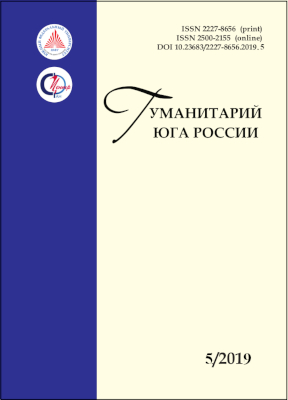Этническая и городская идентичности: противостояние или взаимодополнительность?
Для цитирования
Зязиков М. М. Этническая и городская идентичности: противостояние или взаимодополнительность? // Гуманитарий Юга России. 2019. Том 8. № 5. С. 97-112. DOI: https://doi.org/10.23683/2227-8656.2019.5.8
Аннотация
Основной задачей данной статьи является определение теоретико-методологических оснований изучения взаимодействия этнической и городской идентичностей в условиях урбанизации. Показано, что в результате ускоряющейся урбанизации и развития миграционных процессов многие этносы попадают в новые условия жизнедеятельности условия жизни в крупных и крупнейших городах, в результате чего трансформируются их этническая и городская идентичности. Определена взаимосвязь этнической и городской идентичностей, выделены новые методологические подходы в рамках антропологических исследований городских «племён», основанных на междисциплинарности современного гуманитарного знания. Делается вывод о том, что в условиях миграционного притока в города этническая и городская идентичности взаимодействуют по принципу взаимодополнительности. Анализ этого взаимодействия требует применения междисциплинарного подхода, при котором концептуальный и методологический аппарат урбанистической антропологии, социологии культуры, городской социологии и урбанистики соединился бы с результатами конкретных локальных исследований жизни этносов в современной городской среде.
Ключевые слова:
городское сообщество, городская антропология, этническая идентичность, городская идентичность
Литература
Алексеевский М. Городская антропология. От локальных «племён» к глобальным «потокам» // Горожанин: что мы знаем о жителе большого города? М.: Strelka Press, 2017.
Бахманн-Медик Д. Культурные повороты. Новые ориентиры в науках о культуре. М.: Новое литературное обозрение, 2017.
Гражданская, этническая и региональная идентичность: вчера, сегодня, завтра / рук. проекта и отв. ред. Л.М. Дробижева. М.: Политическая энциклопедия, 2013.
Дробижева Л.М. Консолидирующая идентичность в общероссийском, региональном и этническом измерениях // Перспективы. 2018. № 3 (15). C. 6–21.
Игошева М.А. Ресурсный потенциал этнической идентичности в условиях глобальных трансформаций современного мира // Гуманитарий Юга России. 2019. Т. 8, № 3. C. 133–140.
Кузнецов И.М. Особенности интеграции мигрантов из республик Северного Кавказа в локальных принимающих средах // Социологическая наука и социальная практика. 2018. Т. 6, № 4 (24). С. 51–63.
Лоу С.М. Пласа: политика общественного пространства и культуры. М.: Strelka Press, 2016.
Лукьянчикова М.С. О месте когнитивного компонента в структуре межкультурной компетенции // Россия и Запад: диалог культур. 2000. Вып. 8, т. 1.
Микляева А.В., Румянцева П.В. Городская идентичность жителя современного мегаполиса: ресурс личностного благополучия или зона повышенного риска? СПб.: Речь, 2011.
Население Земли. Режим доступа: https://ru.wikipedia.org/wiki/%D0%9D%D0%B0%D1%81%D0%B5%D0%BB%D0%B5%D0%BD%D0%B8%D0%B5_%D0%97%D0%B5%D0%BC%D0%BB%D0%B8.
Парк Р. Город как социальная лаборатория // Социологическое обозрение. 2002. Т. 2, № 3. С. 3–13.
Радина Н.К. Город в пространстве и времени: проблемы территориальной идентичности в контексте социально-экономических изменений. Н. Новгород: ДЕКОМ, 2015.
Российский статистический ежегодник. 2018: стат. сб. М.: Росстат, 2018.
Самошкина И.С. Территориальная идентичность как социально-психологический феномен : автореф. дис. ... канд. психол. наук. М., 2008.
Суджич Д. В как Bauhaus. Азбука современного мира. М.: Strelka Press, 2017.
Щепанская Т.Б. Символика молодежной субкультуры: опыт этнографического исследования системы: 1986–1989. СПб.: Наука, 1993.
Lefebvre H. The Production of Space. Oxford: Blackwell, 1991.
Redfield R. Folk Cultures of Yucatan. Chicago: The University of Chicago Press, 1941.
White W. Street Corner Society: The Social Structure of an Italian Slum. Chicago: University Press, 1961.
Бахманн-Медик Д. Культурные повороты. Новые ориентиры в науках о культуре. М.: Новое литературное обозрение, 2017.
Гражданская, этническая и региональная идентичность: вчера, сегодня, завтра / рук. проекта и отв. ред. Л.М. Дробижева. М.: Политическая энциклопедия, 2013.
Дробижева Л.М. Консолидирующая идентичность в общероссийском, региональном и этническом измерениях // Перспективы. 2018. № 3 (15). C. 6–21.
Игошева М.А. Ресурсный потенциал этнической идентичности в условиях глобальных трансформаций современного мира // Гуманитарий Юга России. 2019. Т. 8, № 3. C. 133–140.
Кузнецов И.М. Особенности интеграции мигрантов из республик Северного Кавказа в локальных принимающих средах // Социологическая наука и социальная практика. 2018. Т. 6, № 4 (24). С. 51–63.
Лоу С.М. Пласа: политика общественного пространства и культуры. М.: Strelka Press, 2016.
Лукьянчикова М.С. О месте когнитивного компонента в структуре межкультурной компетенции // Россия и Запад: диалог культур. 2000. Вып. 8, т. 1.
Микляева А.В., Румянцева П.В. Городская идентичность жителя современного мегаполиса: ресурс личностного благополучия или зона повышенного риска? СПб.: Речь, 2011.
Население Земли. Режим доступа: https://ru.wikipedia.org/wiki/%D0%9D%D0%B0%D1%81%D0%B5%D0%BB%D0%B5%D0%BD%D0%B8%D0%B5_%D0%97%D0%B5%D0%BC%D0%BB%D0%B8.
Парк Р. Город как социальная лаборатория // Социологическое обозрение. 2002. Т. 2, № 3. С. 3–13.
Радина Н.К. Город в пространстве и времени: проблемы территориальной идентичности в контексте социально-экономических изменений. Н. Новгород: ДЕКОМ, 2015.
Российский статистический ежегодник. 2018: стат. сб. М.: Росстат, 2018.
Самошкина И.С. Территориальная идентичность как социально-психологический феномен : автореф. дис. ... канд. психол. наук. М., 2008.
Суджич Д. В как Bauhaus. Азбука современного мира. М.: Strelka Press, 2017.
Щепанская Т.Б. Символика молодежной субкультуры: опыт этнографического исследования системы: 1986–1989. СПб.: Наука, 1993.
Lefebvre H. The Production of Space. Oxford: Blackwell, 1991.
Redfield R. Folk Cultures of Yucatan. Chicago: The University of Chicago Press, 1941.
White W. Street Corner Society: The Social Structure of an Italian Slum. Chicago: University Press, 1961.
Форматы цитирования
Другие форматы цитирования:
APA
Зязиков, М. М. (2019). Этническая и городская идентичности: противостояние или взаимодополнительность?. Гуманитарий Юга России, 8(5), 97-112. https://doi.org/10.23683/2227-8656.2019.5.8
Раздел
ФИЛОСОФИЯ И ОБЩЕСТВО






